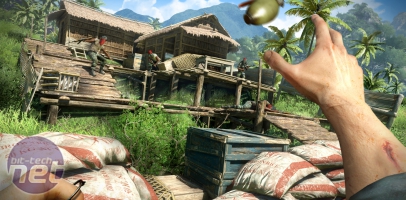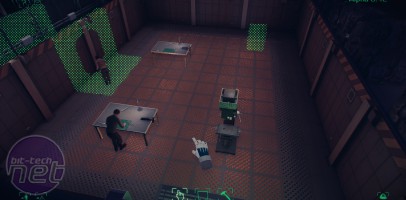What the hell is videogame AI anyway?
July 16, 2014 | 09:05

Dearest readers of bit-tech! Come hither and listen to my whispered words, as I am a troubled soul. For a long time now I have lamented the lack of progress made in the AI sphere of game development. In the years surrounding the millennium AI was bold and bright and exciting. Games like Unreal Tournament, Thief, Black and White and Halo were doing clever and innovative things with artificial intelligence, providing enemies that could use teamwork to outmanoeuvre us, guards that would hunt us, and a big daft monkey that could learn from us.
This continued until around 2005, with FEAR being the last game I can recall with truly memorable AI. Then something changed, and after that nothing changed. Stealth AI has patrolled the same pathways for years, shooter AI crouched behind a wall circa 2006 and decided to make a home there, and when was the last time you played a game that involved the AI learning anything?
[break]
Until very recently this was more or less the sum of my position. Game AI has stagnated. This is bad. We need to do something. Yet I've been reading a little more about the subject lately, and looking into a couple of interesting projects, and this has resulted in my altering my stance. Now I'm unsure what video game AI is at all. What's more, I think my own dilemma is not altogether dissimilar from the problems the games industry is encountering.
The problem begins with the very meaning of the term "AI". When I think of an AI, I picture an android, or a sentient computer like GLaDOS (which, ironically as a game AI is about as intelligent as a shoe). Aside from the fact that they're both created using computers, a technological AI bears little in common with a game AI. The ultimate goal of technological AI is to give it an equal level of sentient intelligence as a human being. Game AI only needs to appear as intelligent as the game in question requires it to, and it can do this by any means necessary, be it through scripting, pathfinding, or more emergent techniques.
Immediately this conflation of concept causes problems. When criticising games it is tempting to judge AI based on its intelligence. But it's very easy to make a game AI super-humanly intelligent, and in most cases that isn't going to make the game better. Ideally, what you want in the majority of games, certainly games like shooters or strategy games, is for the AI to be humanly stupid. It needs to be capable of making clever decisions and reasonable mistakes.
But hang on, isn't that also the goal of technological AI, which we just said was completely different from game AI?
No, the goal of technological AI is sentience. It can be as smart as we dare make it, but regardless of the level of intelligence, the AI needs to be capable of reacting to and coping with any given environment. Game AI, on the other hand, only needs to act human within the confines of the game, which by comparison is a far less demanding task. So an FPS needs its AI to shoot at the player, but not hit them with pinpoint accuracy every time. Other important capabilities are navigation of the map, use of cover, and possibly some tactical decision making, such as flanking and covering fire. It doesn't need to be capable of empathy, or making moral choices, or even feeling anything. This is very different from a game like The Sims, where the AI's ability to demonstrate and respond to physical needs and emotional moods are vital components of the game.
Hence, it appears to be the limitations imposed by gaming genres which defines the difference between game AI and technological AI. The goals of video game AI are smaller, more specific, which is why it seems to be such a broad church with no real direction.
Only, maybe it shouldn't be. Perhaps the reason we don't see game AI developing as we would like is because genre is defining AI development when AI development should be defining genre. Maybe, for video game AI to really progress, a unified approach is necessary.
To understand this, let's consider another area of game development which has made huge leaps in the last ten years - graphics. Historically, graphics development has been driven by the ultimate goal of photo-realism. Now, regardless of whether or not you think photo-realism is a valid target to shoot toward or not, the universal desire of mainstream publishers to push further toward this objective has resulted in a rapid advancement in games' ability to render convincing environments, characters, and so on. It never really mattered what kinds of games were being made, it was just assumed that players would want their games to have better graphics.
AI, on the other hand, has never really received the same attention, never been pushed forward for its own sake. Instead its development has always been based on the needs of individual games. This is a shame, because when individual developers have experimented with new AI techniques, the consequences can be enormous. The entire stealth genre exists because Looking Glass Studios took the two default AI behaviours of "passive" and "aggressive" and sandwiched between them a third state of "alert", where the AI searches for the players presence but it's actively aware of their location.
Now you might be tempted to point to a game like Far Cry as an example of more recent evolutions of AI behaviour. But ultimately all these games do is combine different types of AI scripts that have existed for years. If we're to see radical changes in terms of the games we play, we need to explore new or at the very least rarely used types of AI. Either way, AI needs to be at the forefront of the developer's mind.
The good news is, there are a couple of games on the horizon which are prioritising AI. The first is Simon Roth's Maia, which tasks you with building and maintaining a colony on a hostile alien planet. Inspired by the classic Bullfrog management games, particularly Dungeon Keeper, Maia features autonomous colonists whose actions you can only indirectly manipulate rather than directly control. In addition, Roth plans for Maia to have a far more granular AI simulation than its inspiration. Colonists will have different moods and emotional states which are affected by their environment and can affect their behaviour.
The second game in question is Clockwork Empires, which like Maia is a colony simulator, except set in colonial America. Again, it feature autonomous colonists who you cannot control directly, but it's approach to that autonomy is slightly different. Colonists have different personality traits which affect their behaviour with other colonists. They can also exchange ideas and preserve memories. The ultimate extension of this is that, if you leave your colonists with too little to do, they can become bored and will develop an interest in the occult, which can lead to them unleashing some ungodly terror onto the colony, leading to its destruction. But this system can also express itself in other, smaller ways, how colonists react in battle, how they cope with loss, so on and so forth.
Both games are still heavily in development, so it'll be some time before we see whether they can deliver on their promises. But in theory at least, both Maia and Clockwork Empires lean toward emergent AI that is rarely used in games, where the AI can "learn" through player response to its actions. The Creature in Black and White is the most famous example of this, and why, despite its problems, I have an enduring fondness for that game. But there are other prospects for this AI as well. A typical example would be an XCOM-style game where, instead of controlling your soldiers' actions directly, you train them in certain tactics before a battle, and then send them out to fight autonomously.
Although the more experimental approaches of Maia and Clockwork Empires are exciting, they don't represent a unified push in AI development. Both games are still creating specific AI for specific games, it's just that AI is very much the primary system in those games rather than a secondary or tertiary consideration.
What's more, the importance of AI is only going to grow in the coming years, certainly as a focus of mainstream developers. As tech like VR headsets make games more immersive, while huge open worlds and pretty visuals become more and more commonplace, it will be those studios that can keep that level of immersion consistent using convincing AI behaviours which will garner the most attention. Eventually, game AI will have to stop cheating, and learn to cope with the worlds developers create.
This continued until around 2005, with FEAR being the last game I can recall with truly memorable AI. Then something changed, and after that nothing changed. Stealth AI has patrolled the same pathways for years, shooter AI crouched behind a wall circa 2006 and decided to make a home there, and when was the last time you played a game that involved the AI learning anything?
[break]
Click to enlarge
Until very recently this was more or less the sum of my position. Game AI has stagnated. This is bad. We need to do something. Yet I've been reading a little more about the subject lately, and looking into a couple of interesting projects, and this has resulted in my altering my stance. Now I'm unsure what video game AI is at all. What's more, I think my own dilemma is not altogether dissimilar from the problems the games industry is encountering.
The problem begins with the very meaning of the term "AI". When I think of an AI, I picture an android, or a sentient computer like GLaDOS (which, ironically as a game AI is about as intelligent as a shoe). Aside from the fact that they're both created using computers, a technological AI bears little in common with a game AI. The ultimate goal of technological AI is to give it an equal level of sentient intelligence as a human being. Game AI only needs to appear as intelligent as the game in question requires it to, and it can do this by any means necessary, be it through scripting, pathfinding, or more emergent techniques.
Immediately this conflation of concept causes problems. When criticising games it is tempting to judge AI based on its intelligence. But it's very easy to make a game AI super-humanly intelligent, and in most cases that isn't going to make the game better. Ideally, what you want in the majority of games, certainly games like shooters or strategy games, is for the AI to be humanly stupid. It needs to be capable of making clever decisions and reasonable mistakes.
Click to enlarge
But hang on, isn't that also the goal of technological AI, which we just said was completely different from game AI?
No, the goal of technological AI is sentience. It can be as smart as we dare make it, but regardless of the level of intelligence, the AI needs to be capable of reacting to and coping with any given environment. Game AI, on the other hand, only needs to act human within the confines of the game, which by comparison is a far less demanding task. So an FPS needs its AI to shoot at the player, but not hit them with pinpoint accuracy every time. Other important capabilities are navigation of the map, use of cover, and possibly some tactical decision making, such as flanking and covering fire. It doesn't need to be capable of empathy, or making moral choices, or even feeling anything. This is very different from a game like The Sims, where the AI's ability to demonstrate and respond to physical needs and emotional moods are vital components of the game.
Click to enlarge
Hence, it appears to be the limitations imposed by gaming genres which defines the difference between game AI and technological AI. The goals of video game AI are smaller, more specific, which is why it seems to be such a broad church with no real direction.
Only, maybe it shouldn't be. Perhaps the reason we don't see game AI developing as we would like is because genre is defining AI development when AI development should be defining genre. Maybe, for video game AI to really progress, a unified approach is necessary.
To understand this, let's consider another area of game development which has made huge leaps in the last ten years - graphics. Historically, graphics development has been driven by the ultimate goal of photo-realism. Now, regardless of whether or not you think photo-realism is a valid target to shoot toward or not, the universal desire of mainstream publishers to push further toward this objective has resulted in a rapid advancement in games' ability to render convincing environments, characters, and so on. It never really mattered what kinds of games were being made, it was just assumed that players would want their games to have better graphics.
Click to enlarge
AI, on the other hand, has never really received the same attention, never been pushed forward for its own sake. Instead its development has always been based on the needs of individual games. This is a shame, because when individual developers have experimented with new AI techniques, the consequences can be enormous. The entire stealth genre exists because Looking Glass Studios took the two default AI behaviours of "passive" and "aggressive" and sandwiched between them a third state of "alert", where the AI searches for the players presence but it's actively aware of their location.
Now you might be tempted to point to a game like Far Cry as an example of more recent evolutions of AI behaviour. But ultimately all these games do is combine different types of AI scripts that have existed for years. If we're to see radical changes in terms of the games we play, we need to explore new or at the very least rarely used types of AI. Either way, AI needs to be at the forefront of the developer's mind.
The good news is, there are a couple of games on the horizon which are prioritising AI. The first is Simon Roth's Maia, which tasks you with building and maintaining a colony on a hostile alien planet. Inspired by the classic Bullfrog management games, particularly Dungeon Keeper, Maia features autonomous colonists whose actions you can only indirectly manipulate rather than directly control. In addition, Roth plans for Maia to have a far more granular AI simulation than its inspiration. Colonists will have different moods and emotional states which are affected by their environment and can affect their behaviour.
Click to enlarge
The second game in question is Clockwork Empires, which like Maia is a colony simulator, except set in colonial America. Again, it feature autonomous colonists who you cannot control directly, but it's approach to that autonomy is slightly different. Colonists have different personality traits which affect their behaviour with other colonists. They can also exchange ideas and preserve memories. The ultimate extension of this is that, if you leave your colonists with too little to do, they can become bored and will develop an interest in the occult, which can lead to them unleashing some ungodly terror onto the colony, leading to its destruction. But this system can also express itself in other, smaller ways, how colonists react in battle, how they cope with loss, so on and so forth.
Both games are still heavily in development, so it'll be some time before we see whether they can deliver on their promises. But in theory at least, both Maia and Clockwork Empires lean toward emergent AI that is rarely used in games, where the AI can "learn" through player response to its actions. The Creature in Black and White is the most famous example of this, and why, despite its problems, I have an enduring fondness for that game. But there are other prospects for this AI as well. A typical example would be an XCOM-style game where, instead of controlling your soldiers' actions directly, you train them in certain tactics before a battle, and then send them out to fight autonomously.
Click to enlarge
Although the more experimental approaches of Maia and Clockwork Empires are exciting, they don't represent a unified push in AI development. Both games are still creating specific AI for specific games, it's just that AI is very much the primary system in those games rather than a secondary or tertiary consideration.
What's more, the importance of AI is only going to grow in the coming years, certainly as a focus of mainstream developers. As tech like VR headsets make games more immersive, while huge open worlds and pretty visuals become more and more commonplace, it will be those studios that can keep that level of immersion consistent using convincing AI behaviours which will garner the most attention. Eventually, game AI will have to stop cheating, and learn to cope with the worlds developers create.

MSI MPG Velox 100R Chassis Review
October 14 2021 | 15:04












Want to comment? Please log in.